|
August 11, 2021 - No. 68
Emergency Rooms -- the Quebec Example
All-Out Assault on Workers' Right to Speak and Organize

Interviews
• Denis Cloutier, President, Union of Health Care Professionals for Montreal East
• Francis Charbonneau, Vice-President, Northern Sector, Union of Health Care Professionals for the Laurentides
• Karine d'Auteuil, Interim President, Union of Health Care Professionals for the Outaouais
Alberta Nurses' Province-Wide Day of Action
• Standing Up to Government Wrecking of Health Care
- Peggy Morton
Emergency Rooms -- the Quebec Example
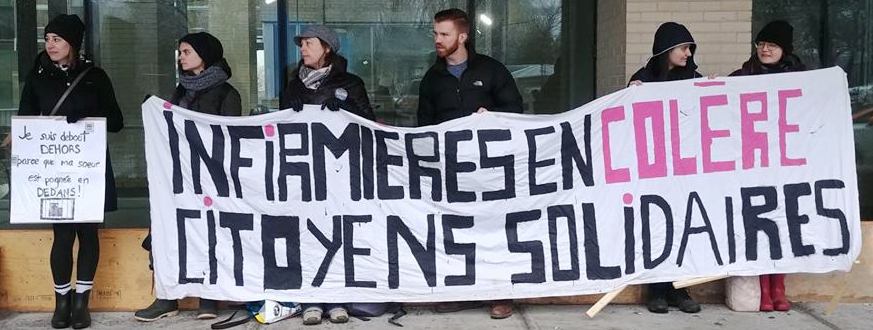
An acute crisis is raging in hospital emergency rooms (ERs). The
following interviews focus on the situation in Quebec, but a similar
situation exists across Canada. The most visible sign of the crisis is
the shortage of personnel required to care for emergency room patients.
Patients are facing long waits in the ERs, leaving without being
treated, and the cuts and closures in the care units are such that even
admitted patients cannot be sent to the appropriate hospital ward and
have to stay in the ER. The situation became so critical in the
Outaouais that the Gatineau hospital's ER was completely closed for
several days at the end of June and patients in need of emergency care
had to
be diverted to emergency rooms in other hospitals in the region. The ER
reopened in July, initially offering services for some emergency cases
only, and is now open to all cases only from 8:00 am to 6:00 pm each day.
 The
shortage of nurses and other staff is the result of more than 30
years of the neo-liberal anti-social offensive by the rich and
successive governments against the health care system. The crisis has
been further
exacerbated in the context of the pandemic by the systematic use of
arbitrary powers such as Ministerial Orders that have attacked the
dignity, rights
and physical and mental health of those who care for and protect us.
These measures have led to illness and thousands of resignations. The
shortage of nurses and other staff is the result of more than 30
years of the neo-liberal anti-social offensive by the rich and
successive governments against the health care system. The crisis has
been further
exacerbated in the context of the pandemic by the systematic use of
arbitrary powers such as Ministerial Orders that have attacked the
dignity, rights
and physical and mental health of those who care for and protect us.
These measures have led to illness and thousands of resignations.
Nurses are making it clear that the use of arbitrary powers against
them by the state and hospital administrations is one of the main
causes, if not the primary cause, of the loss of staff and their
non-replacement. The human factor is seen as a cost to be reduced and
human beings as troublemakers to be suppressed, voices to be silenced,
thus aggravating the crisis. Alongside these attacks on the workers,
attempts are made to impose a code of silence to stop health care
workers from speaking about these conditions. Recently
we have seen many employers, inspired by government's rule by decree,
take legal action against nurses who have staged sit-ins to say that
they are at the end of their rope and that staying on the job for more
hours puts their health and the health of patients at risk. They assess
nurses' actions within the narrow confines of what collective
agreements allow or do not allow (the same collective agreements that
the government has declared null and void), and deny that nurses are
exercising their right to conscience and to speak out about conditions
which endanger themselves and their patients. Meanwhile, avenues for
dialogue, negotiation and consultation are destroyed. The
nurses' actions bring into being new forms through which those who do
the work affirm their rights under today's conditions. It is their
human right to express themselves about the working conditions they and
the population require. It is their duty as well as professionals who
have a commitment to the well-being of the people. They are doing so
courageously and deserve our support.
Workers' Forum proudly salutes the emergency room nurses who
are playing a leading role in speaking up and proposing solutions to
resolve this crisis in a way that benefits the people. In this issue,
we publish three interviews with representatives of nurses' unions.

Interviews
The crisis in emergency rooms (ERs) is very real. It is directly related to the lack of nursing staff in the emergency rooms.
The staff shortage and having to work continuously understaffed
throughout hospitals, even more so in the ERs, causes more
and more serious difficulties for nurses. The most well
known is the use of mandatory overtime, which has driven many to work
elsewhere, for other employers where the shortage is less
severe. There is a shortage of nurses everywhere. More and more nurses
have gone to the private sector in recent years, which, with COVID-19,
has made the staffing shortage worse. The conditions are very bad.
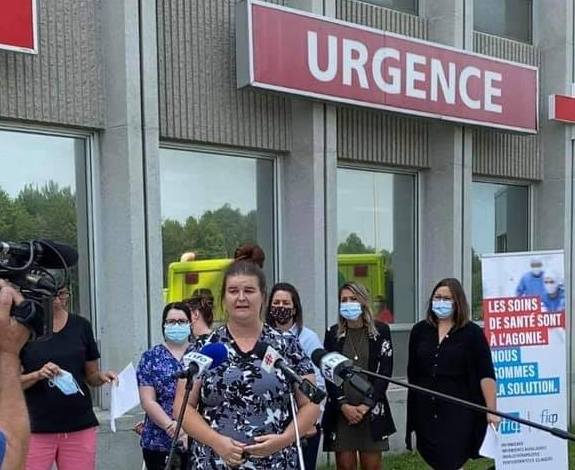 While we were working with COVID-19, all the nurses in the network
faced challenges; shifts moved around, full-time work imposed,
overtime imposed, etc. Meanwhile, the nurses employed by private
agencies did not have these conditions. So we ended up with
situations that were even worse this year. Because of these imposed
conditions, it is very difficult to recruit new nurses or to convince
in-house nurses to go work in the ER, for example. While we were working with COVID-19, all the nurses in the network
faced challenges; shifts moved around, full-time work imposed,
overtime imposed, etc. Meanwhile, the nurses employed by private
agencies did not have these conditions. So we ended up with
situations that were even worse this year. Because of these imposed
conditions, it is very difficult to recruit new nurses or to convince
in-house nurses to go work in the ER, for example.
One
of
the main factors that has caused so many nurses to leave is the Quebec
government's Ministerial
Order 007. This order, which was in effect
from March 2020 until about a month ago -- almost a year and a half --
allowed for overriding collective agreements, for nurses to be
moved at the whim of employers, for their workload to be increased,
while nurses who came from the private sector were not subject to this
order. In the past there was a balance between the public network and
the private agencies that has been broken. Agency nurses were few in
number. They were paid more than public sector nurses but they were
sent where no one wanted to go. However, in times of shortage, to
attract agency nurses, the Integrated Health and Social Services
Centres and the Integrated University Health and Social Services
Centres have guaranteed them working conditions far superior to
those of the public sector nurses.
Working under-staffed, being forced to work overtime, became far too
common in nurses' work, which pushed more and more of them to leave.
Mandatory overtime was already a management tool before the pandemic
and it became even more so during the pandemic and it is still a
management tool as the pandemic is subsiding. There is also
a backlog of surgeries, medical care, etc. It's not just COVID-19 that
we are dealing with.
 The
Ministry must get involved and compensate nurses for the inconveniences
they have suffered. Compensation for mandatory overtime work could take
the form of days off. The Ministry does not acknowledge that
this is forced labour. It acts as if nurses are voluntarily accepting
the mandatory overtime work so it does not raise the issue
of compensation. Many nurses would want to work in the ER if they were
offered stable positions and a work schedule without mandatory
overtime. This way of managing is unacceptable. It
makes the nursing profession overall less and less attractive for the
future. It is a challenge. The greatest difficulties are in the ERs and
that is why it is the place that people leave first. The
Ministry must get involved and compensate nurses for the inconveniences
they have suffered. Compensation for mandatory overtime work could take
the form of days off. The Ministry does not acknowledge that
this is forced labour. It acts as if nurses are voluntarily accepting
the mandatory overtime work so it does not raise the issue
of compensation. Many nurses would want to work in the ER if they were
offered stable positions and a work schedule without mandatory
overtime. This way of managing is unacceptable. It
makes the nursing profession overall less and less attractive for the
future. It is a challenge. The greatest difficulties are in the ERs and
that is why it is the place that people leave first.
Mandatory overtime is not something that was negotiated with the
union. It is a professional obligation related to the Code of Ethics of
the Quebec Order of Nurses that is being overused. It is not the union
that allows a boss to hold an employee against his or her will. We
would never agree to that. We think that the government should stop
talking about this situation as something exceptional. In
Maisonneuve-Rosemont, the employer imposed mandatory overtime 52 times
in one weekend a few weeks ago. In the past they have tried to
compensate nurses with bonuses for working in the ERs, but
there is a limit. When you steal time from people it becomes inhumane.
A
full-time job now means being forced to work two or three overtime
shifts in a single week. It becomes unbearable.
I don't believe in private employment agencies in the public system.
I don't believe in this cohabitation. Employers say that private
agencies are there to help us. This does not help us. If there were no
private placement agencies all nurses would be working in the public
network. We have to favour the collective, the collective as a group of
employees, and the collective as citizens of Quebec by having an equal
public network everywhere so everyone has the same conditions. I don't
see a place for the private sector in this.
Another problem is the competition between hospitals. Hospitals are
competing for staff, competing for the same nurses. Competition is
difficult. I represent Maisonneuve-Rosement Hospital and Santa Gabrini
Hospital. It's hard to compete with the University of Montreal Health
Centre which is brand new, which is on the metro line. Why would a nurse go to work in a hospital that is not modern if she
or he is going to suffer all sorts of inconveniences? Employers are in
competition with each other and those who are favoured with brand new
buildings, or geographically, will always be able to recruit while
others are systematically short of manpower.
Can we accept that there should be such inequality in health care
from region to region or facility to facility? The Ministry has never
wanted to deal with this problem. The Ministry must coordinate all of
this. In terms of hiring, the Ministry could coordinate a better
distribution of the workforce. Many things would be possible, but the
Ministry
does not intervene in anything. It washes its hands of any
accountability.

There are multiple factors that explain the crisis in the emergency
rooms (ERs). Many people left because of the ministerial decree, the
obligation to work full time, the obligation to work twelve hours, even
when there were very few cases of hospitalization for COVID-19. The
Laurentides region is very large and some places were comparable to
Montreal in terms of cases of COVID-19, but if you go north there were
places where there were no COVID-19 cases and yet the decree was
applied wall to wall. It became the employer's easiest solution to deal
with understaffing, instead of finding ways to keep staff in place with
adequate working conditions. The employer abused the Ministerial Order and forced people to work longer hours than they were
fit to do, which left many people exhausted. People have been
leaving
on sick leave, either on salary insurance or compensation from
the Labour Standards,
Pay Equity and Workplace Health and Safety Board Commission. Many
people leave the ER to go to other settings
that may be less understaffed. The other settings may be in the same
facility; for example, home support which has a Monday to Friday
daytime schedule, and perhaps one weekend out of six that you have to
work. There are some who go to private employment agencies, or leave
the health care system altogether.
For patients, the ER is the gateway to the system. Once you're in
the ER, if you're going to be admitted to hospital you have to be
relocated, maybe to a medical unit. This requires that the medical
units are able to receive patients. The same abuse of Ministerial Orders has happened in
medical units, so they are also
very short-staffed, so they reduce the number of beds, they close beds. Then patients end up staying in the ER.
This creates a great deal of extra work.
We are experiencing this situation in several places in the
Laurentides right now. In Mont-Laurier, the situation in medicine and
surgery is difficult. In Saint-Eustache, half of the intensive care
beds have been closed, so patients who are more unstable and who
require greater care, instead of going to the intensive care unit in
Saint-Eustache,
must go to the intensive care unit in Saint-Jérome. However, at
Saint-Jérome, there is also a lack of personnel, and the number
of beds has also been reduced to two-thirds of
capacity. This means that two ERs can no longer send
unstable cases to the intensive care unit because they are full.
A few weeks ago, nurses from the ER and intensive care units
at the Mont-Laurier Hospital held a sit-in. In this hospital, at night
we need about six nurses to cover the ER and intensive care.
Currently we have one or two. The evening nurses, every day, had to
work mandatory overtime and stay on the night shift to provide
care. After talking to the employer several times, asking for solutions
to be put in place, and not being listened to, the only way they found
to make it clear that they were exhausted, could not stand having to
work overtime every day, was not to report for their evening shifts. It
was their daytime colleagues who had to stay and work overtime to
replace them.
 The first thing the employer did was to call the Administrative Labour Tribunal to muzzle the
nurses and force
them to go back to work and not take this kind of action again. The
employer used
the legal route instead of sitting down with us to see how to find
staff and make sure that other sit-ins would not take place in the
Laurentides. The local health authority was afraid that people would
expose how bad it is everywhere. At the same time, it stated publicly
that its number one strategy was to be solution-oriented with the
union. In fact, the employer never met with us about the Mont-Laurier
ER, never wanted to put solutions in place and went straight to legal
action. This is not a solution. The first thing the employer did was to call the Administrative Labour Tribunal to muzzle the
nurses and force
them to go back to work and not take this kind of action again. The
employer used
the legal route instead of sitting down with us to see how to find
staff and make sure that other sit-ins would not take place in the
Laurentides. The local health authority was afraid that people would
expose how bad it is everywhere. At the same time, it stated publicly
that its number one strategy was to be solution-oriented with the
union. In fact, the employer never met with us about the Mont-Laurier
ER, never wanted to put solutions in place and went straight to legal
action. This is not a solution.
We have submitted solutions to the employer since March, but he does not listen to us.
One of the solutions is to take the jobs that are not attractive,
because they are unstable, and stabilize them so that people will apply
for them. These are positions where people have to work rotating shifts -- day, evening and night. This is not viable and it's
often these positions that remain vacant in the units. Instead of
stabilizing
them, the employer has taken all the positions that were stable and
vacant and turned them into rotational positions.
Positions have to be upgraded to full-time. Part-time positions need
to be turned into full-time positions that are stable, instead of
having part-time positions so nurses have to increase their hours by
accepting work that is offered during the day, evening, night. They
don't know when they are going to be called to work and can be called in at
the last
minute. It's hard for families to organize their lives.
The government has taken actions that have added fuel to the fire.
For example, the government has given incentives for working during
COVID-19, but it has put so many restrictions that it has created
some very serious problems. For example, the government set a total amount
of $1,000 per month that you could receive, but you
had to work full-time, never be sick, never be absent for any reason
other than your vacation and holidays. This caused people to work
themselves to exhaustion, even working when they were sick, to get this
amount. The incentive pay was stopped at the beginning of July and we
saw people start to miss work even more because they were so
exhausted.
Now, given the crisis in areas such as in the ERs, and the medical,
surgical and birthing units, the government has brought back the
$1,000 bonus but only in those units. The other units don't understand
why they are excluded when they too are suffering, so it creates a lot
of dissatisfaction between the units. The government does not
recognize everyone's work.
Health care professionals continue to work very hard to provide care
to the population. It hurts us when we have to engage in actions like
sit-ins because we know that it disturbs patient care. But we have no
choice but to do so in order to bring attention to the need for working
conditions that will attract new people to the profession and sustain a
public health network and not have a private health network like our
U.S. neighbours.

 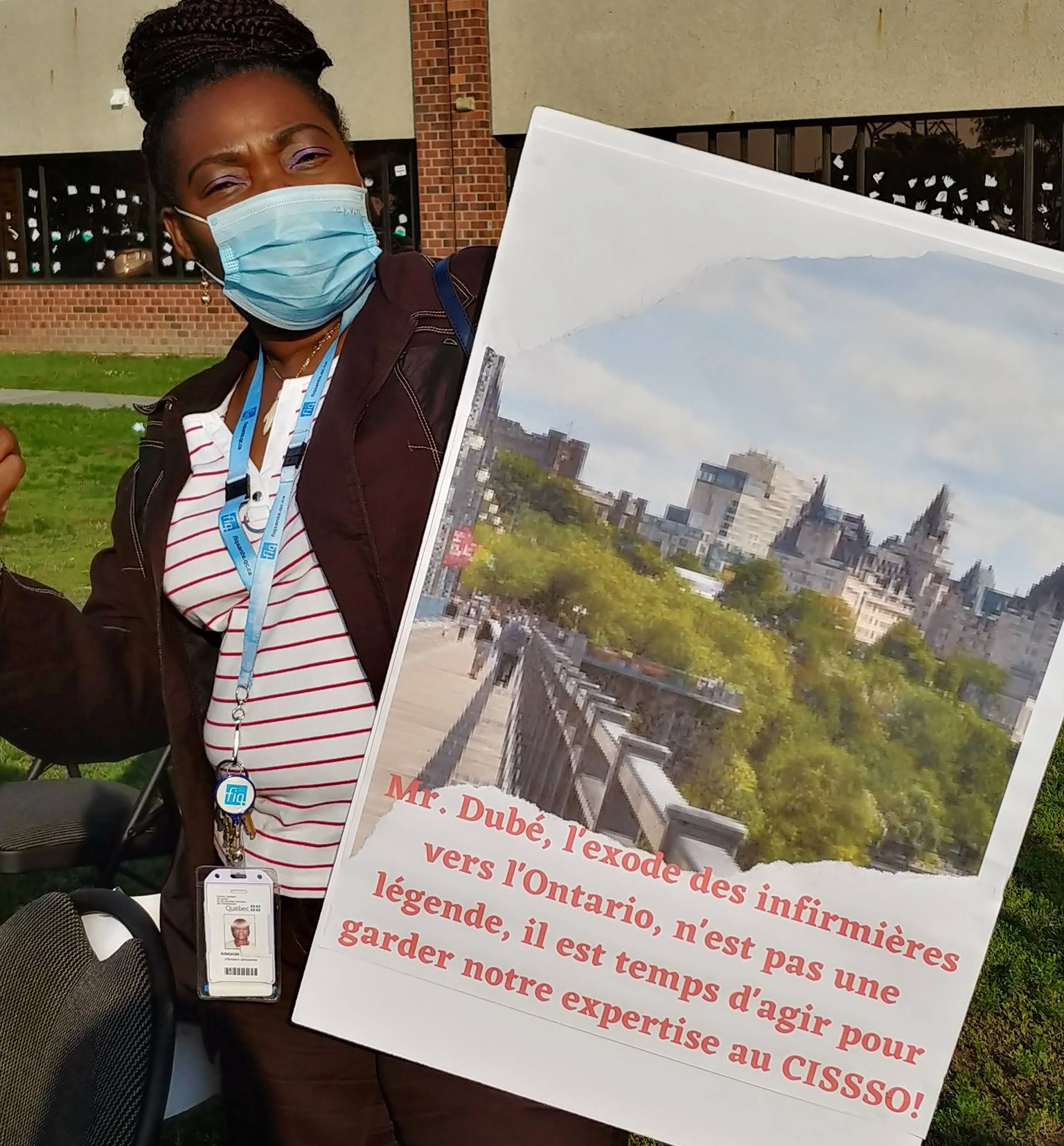
Gatineau health care workers protest untenable working conditions, July 15, 2021.We
are currently experiencing a crisis unlike any before. The Gatineau
hospital emergency room had to be closed mainly because of a lack of
expertise, a lack of nurses with experience in the emergency room (ER),
who have expertise in triage and trauma. A novice nurse who arrives in
the ER cannot go to the trauma room nor do triage. At the Gatineau
Hospital this is what caused the problem and we had a service
breakdown. We don't have enough expertise to provide safe care to the
population. This is why the ER was closed. By closing the second
largest ER in the Outaouais, we were overloading the other ERs. It has
been partially reopened from 8:00 am to 6:00 pm, to prevent the other
ERs in the region from being overwhelmed.
We talk a lot about the ERs, because they are often in the
media, but in the Outaouais we are also experiencing a dangerous
shortage of staff in care units. For example, at the Gatineau Hospital we have
less than 45 per cent of positions filled on the care units. At the
Papineau Hospital as well, a care unit was closed because there was too
great a
shortage of personnel. In other care units as well, we can no longer
provide 100 per cent service with the current staffing levels.
It is certain that the underfunding of the Outaouais, which we have
been experiencing for years, has hurt us a lot. In addition, we are
right next to Ontario, so it's easy for a care professional to cross
the bridge to get better wages and working conditions than ours.
The Minister of Health Christian Dubé wants to continue to
ignore the border premium, so we will just continue to be pushed to the
wall. The purpose of a border premium would be to be competitive with
Ontario. A nurse who decides to come and work in the Outaouais should
receive a border premium. In the region, evening and night
premiums are already increased so that we can keep our nurses, but this
is no longer enough. We are calling on Minister
Dubé to introduce a border premium. Not long ago, the Montfort
Hospital in Ottawa offered a $10,000 bonus for working one year full
time in Montfort. How can we at the Integrated Health and Social
Services Centres in the Outaouais (CISSSO) compete with that?
We have been saying this for a long time and that is why we have a
special status budget envelope due to the fact that we are next to
Ontario. That envelope needs to be reviewed and it also needs to be
used wisely.
 There
was a study in 2015 that clearly demonstrated the underfunding
that we are experiencing in the Outaouais compared to our health needs.
With our population, we should have a health budget that is higher than
what it is now.The Minister of Families Mathieu Lacombe said that his
priority is the health care system but he has done nothing to solve the
problem of the personnel shortage. The health care system is worse than
it was at the beginning of his mandate. The shortage has worsened. There
was a study in 2015 that clearly demonstrated the underfunding
that we are experiencing in the Outaouais compared to our health needs.
With our population, we should have a health budget that is higher than
what it is now.The Minister of Families Mathieu Lacombe said that his
priority is the health care system but he has done nothing to solve the
problem of the personnel shortage. The health care system is worse than
it was at the beginning of his mandate. The shortage has worsened.
We are not facing the usual shortage that we have been experiencing
for years. We are facing a dangerous shortage where care is at risk. We
do not have the necessary funding to create attractive positions and
working conditions and to ensure the retention of care personnel in the
Outaouais. The pandemic has greatly weakened retention. We
cannot rebuild a health system without making investments. The Minister
of Health is just shifting the problem by closing beds here and there,
but that doesn't solve the problem.
We continue to hammer home the point that we are underfunded and
that the government needs to take action. Increased funding for health
care in the Outaouais is at the heart of the problem of getting back on
track and ensuring adequate health care for the population
A few weeks ago, at a press conference, Minister Dubé
presented three solutions to the problems of emergency rooms. He
mentioned the reorientation towards Family Medicine Groups (FMGs). As
far as referrals are concerned, there has been an enormous improvement
in the region. We have gone from five to 10 per cent of referrals in
emergency rooms to FMGs, to about 20 to 30 per cent of patients. A very
good team has already been put in place to bridge the gap between the FMGs and
family physician clinics. This is not
going to help us reduce the staff shortage. Even though the occupancy
rate is decreasing, the basic positions that are needed are
not being filled. On the 7th North Care Unit at the Gatineau Hospital,
I have nine nursing positions out of 29 that are filled. Taking away patients will not help to fill these
positions. The other two avenues put forward by the Minister are that
family doctors keep their offices open for longer hours, which is already being done, and
that
family doctors take on more patients, especially those with symptoms of
COVID-19. These three solutions will not address the shortage of staff on the
care units and in the ERs. There is no shortage of space for
patients. It is the care professionals who are lacking.
We need stable departments, positions and shifts. We need the tools to do our work, and that means funding.
Also, the employer now takes us to the Administrative Labour
Tribunal when we refuse work when our conditions become totally unsafe.
They say that a work refusal is a violation of our collective
agreement. But beyond the collective agreement, there is the code of
ethics of a health care professional. I don't want to put my patient at
risk,
nor my license. If my clinical judgment tells me that being alone to
care for 27 patients is too much, that it is putting care at risk, it
is my duty to say so and refuse work that poses an imminent
danger. We are governed by our code of ethics above all, and by our
conscience as well.
The government does not understand this. It treats us as pawns. We
are not pawns. We are care professionals and we have a duty to our
patients above all to work safely.

Alberta Nurses' Province-Wide Day of Action
- Peggy Morton -
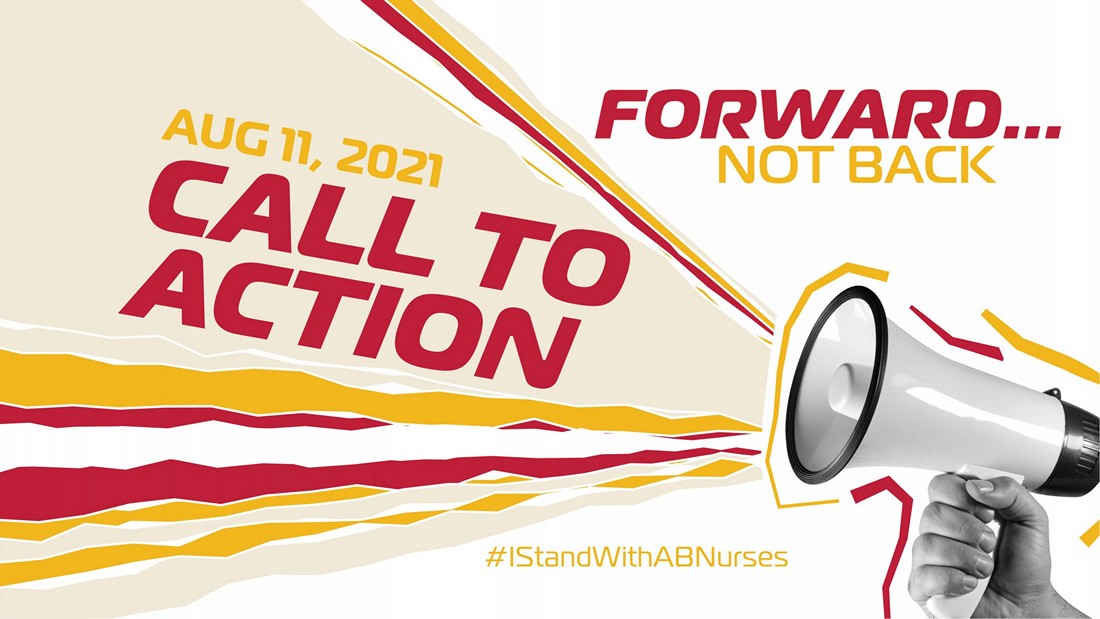
United Nurses of Alberta (UNA) is holding a province-wide Day of Action on August 11 under the banner Forward Not Back! UNA
will be joined by health care workers represented by the Alberta Union
of Provincial Employees (AUPE) and the Canadian Union of Public
Employees (CUPE).
"I think you would be hard-pressed to find an Albertan who doesn't
respect the work that nurses and health-care workers have done during
the pandemic, and always. We want to make sure the public knows how
much disrespect is being shown to us by the UCP government," UNA Second
Vice-President Cam Westhead said during an
information picket held at the Sturgeon Hospital in St. Albert on July
26.
"We're
being fed a narrative that it is us, the frontline heroes, that need to
pay for bad government policy and government debt, like we haven't paid
already with time away from our families, fear of catching COVID, and
spreading COVID in the early months, moral injury, and burning out,"
UNA Local 85 President Orissa Shima told CTV
News Edmonton. "What is a thank you when you're telling us we're worth
less?" she asked. "It's a slap in the face, it's a punch in the gut,
after all we've been through and given during this pandemic," Shima
said.
"We need to recruit and retain nurses and you're not going to do
that by telling us we're worth less. We need to recognize that there's
a shortage. We need more nurses, not less, and we can't afford to drive
nurses out of the province," Shima said.
UNA returned to the "negotiating table" after a 16-month pause, to
find that the employers have been directed by the government to step up
their attacks on registered nurses and on other health care workers as
well.
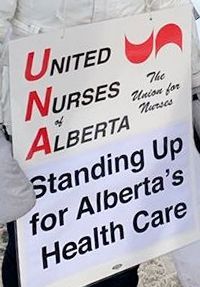 Alberta nurses are standing firm, rejecting the insulting and
completely unacceptable demands from Alberta Health Services (AHS) and other
employers who are demanding a three per cent wage rollback, withdrawal
of a two per cent lump sum payment, and hundreds of other rollbacks to
their remuneration and conditions of work established in the 44
years since UNA was established. Alberta nurses are standing firm, rejecting the insulting and
completely unacceptable demands from Alberta Health Services (AHS) and other
employers who are demanding a three per cent wage rollback, withdrawal
of a two per cent lump sum payment, and hundreds of other rollbacks to
their remuneration and conditions of work established in the 44
years since UNA was established.
The UCP government is making similar proposals to AUPE. AUPE's
General Support Services Bargaining Committee says, "A four per cent
wage rollback would be devastating for us and our families. Many of us
already work multiple jobs to make ends meet, and some of us are single
parents. We cannot afford wage rollbacks like this,
especially after the increased workload and stress thanks to the
pandemic. Before bargaining went on hold for the pandemic, AHS had
tabled a one per cent wage rollback. Is AHS saying we have become even
less valuable since the pandemic began?"
All of these changes are directed by the Kenney government. Under the provisions of Bill 21, the Public Sector Employers Act 2019,
the Minister of Labour can issue confidential directives that an
employer receiving any funds from the provincial government must follow
when "engaging in collective bargaining or a related process." The
employer cannot disclose the directive to any third party without prior
consent of the Minister, including to the union with which it is
supposedly engaged in "good faith bargaining." These secret directives
may set out the length of a collective agreement and "fiscal limits."
The Kenney government is not engaged in "negotiations" but is intent on
gutting the collective agreement through which nurses have established
their current wages, benefits, and working conditions.
Nurses
and health care workers across Canada are speaking out about their
unsustainable conditions of work. Exhaustion and burnout are at very
high levels, but despite the evident shortage of nurses and
difficulties retaining nurses, the Kenney government has announced
plans to cut the equivalent of 750 full-time
registered nurses, and to contract out up to 11,000 jobs in housekeeping, food
services and laundry. Emergency departments and other crucial services
in Alberta have closed beds in recent weeks for lack of staff.
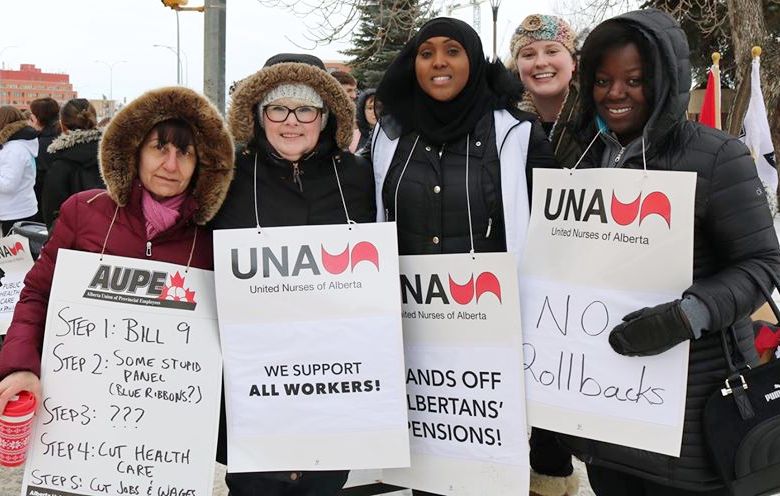 Neo-liberal governments all claim that health care and other public
sector workers are a drain on the economy, refusing to recognize the
tremendous value they create. They are demanding that the workers' claim
on the value they produce be reduced. Alberta nurses have militantly
defended their right to decide what wages, benefits and working
conditions are acceptable to them, and will not accept wages and
working conditions which jeopardize patient care, drive nurses from the
profession and insult their dignity. They have always had the full
support of Albertans in doing so. Neo-liberal governments all claim that health care and other public
sector workers are a drain on the economy, refusing to recognize the
tremendous value they create. They are demanding that the workers' claim
on the value they produce be reduced. Alberta nurses have militantly
defended their right to decide what wages, benefits and working
conditions are acceptable to them, and will not accept wages and
working conditions which jeopardize patient care, drive nurses from the
profession and insult their dignity. They have always had the full
support of Albertans in doing so.
Workers' Forum calls on all Alberta workers and concerned
citizens to go all out in support of nurses and all health care
workers. Join a picket line on August 11. Do not permit the Kenney
government to escalate the wrecking of public health care and the
brutal disregard for the rights and well-being of those who provide
care and
services.

(To access articles individually click on the black headline.)
PDF
PREVIOUS
ISSUES | HOME
Website: www.cpcml.ca
Email: office@cpcml.ca
|

